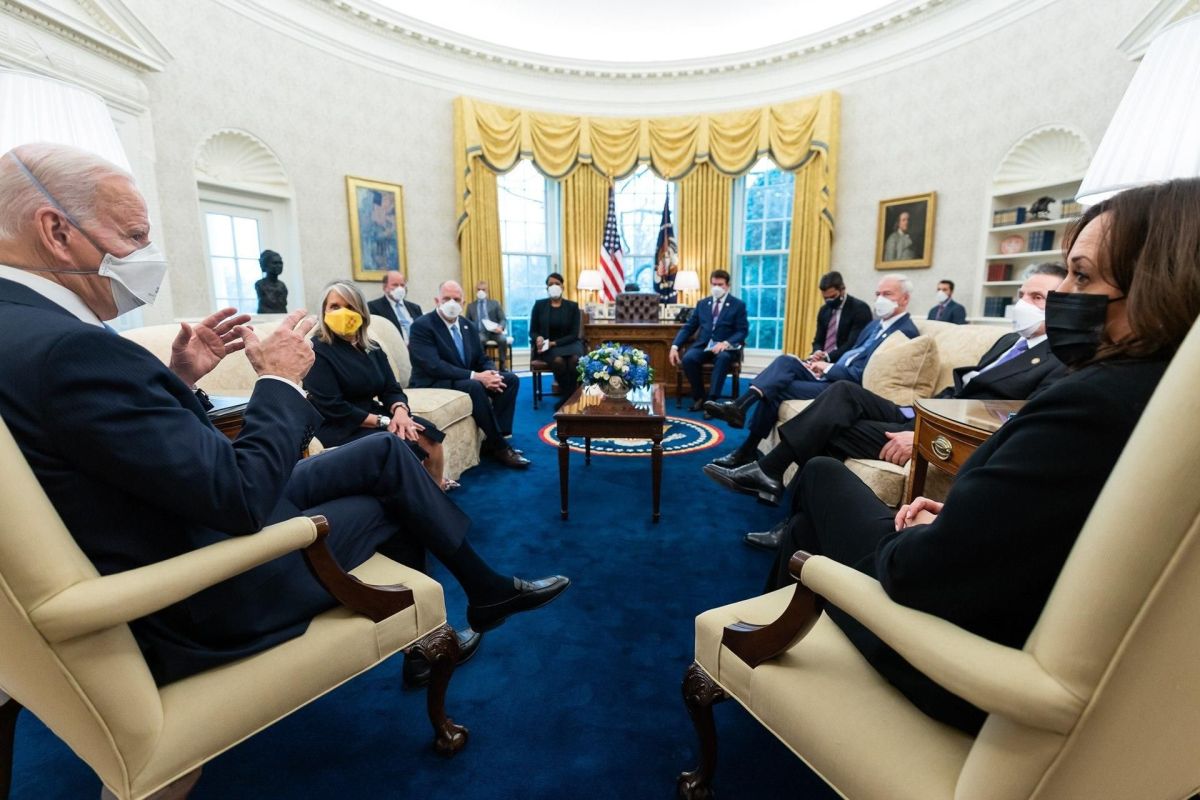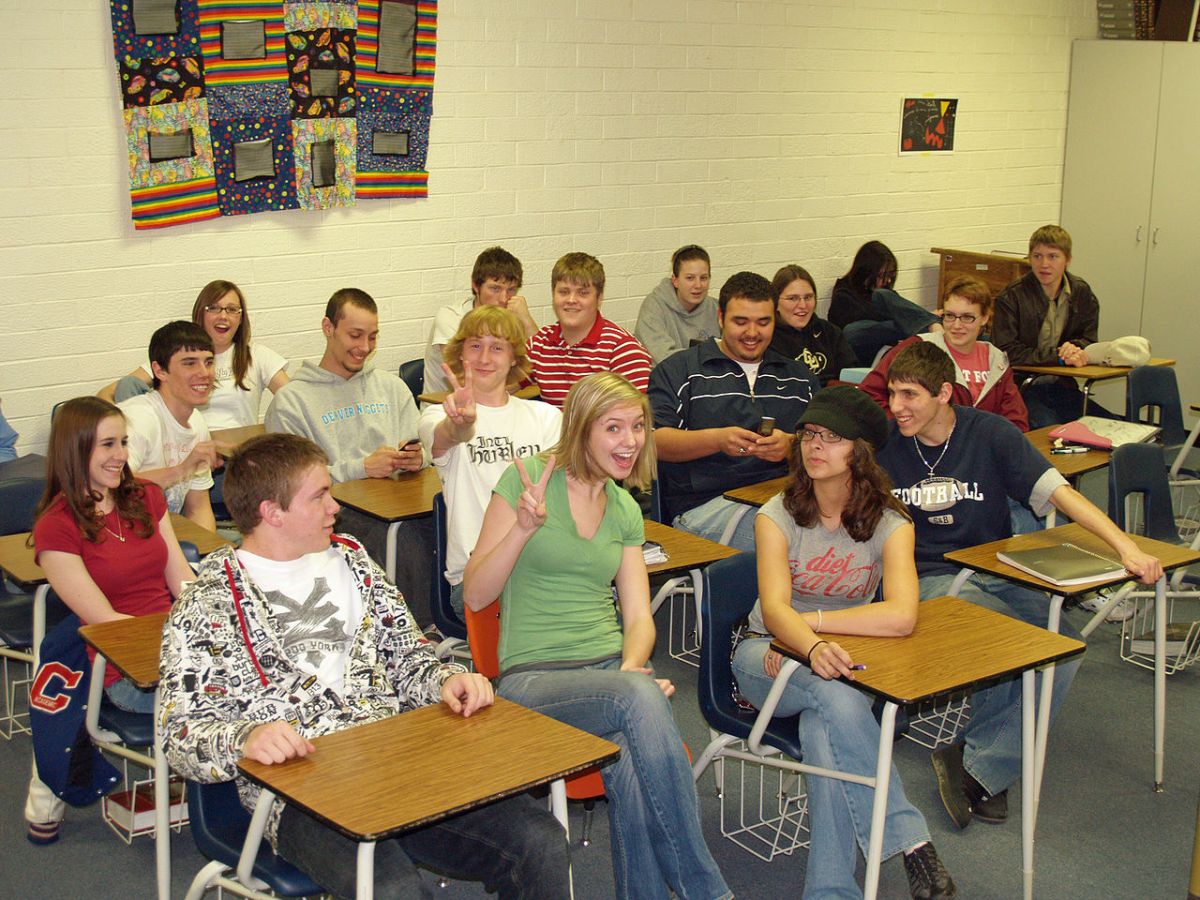Tim Kirby
The door is open to think about how we can change our 1800's education to meet up with or fight against the demands of this upcoming new industrial revolution, Tim Kirby writes.
It is hard to say exactly why, but political change of a grand sweeping nature simply does not occur without some sort of crisis to demand it. A catalyst is always needed. For years it has been obvious that many office jobs could simply be done from home without wasting employees' time and earnings on a commute and workspace. If it were not for the Coronavirus, driving over an hour to work on an inferior computer in a beige cubicle surrounded by people you hate would still seem to be the only possible option. Now working from home is the "new normal" and one that actually works to the benefit of many. So as our catalyst for change is burning bright it is surprising that Joe Biden is pushing for schools to go back to the way they were in a pre pandemic world as fast as possible. Why would education be exempt from the biggest opportunity for political change since 9/11? And what sort of education would actually function to meet the challenges of the near future under the supposed 4th Industrial Revolution?
Biden's proposal - a return to the failing normalcy of the recent past
To put it simply Joe Biden's vision for American schools in a post-pandemic (late-pandemic) world is to "have schools open five days a week in-person, but stressed the administration would follow the guidance of science and medical experts on how to safely reopen". Which means that everything will eventually be reset to the way things were before this virus came about except with masks and other feel-good but questionably effective health safety measures.
Image: Biden's simple solution - turn the clock back to 2019 with masks.
In the short term, the plan is to have "in-person teaching at least one day a week in the majority of schools within Biden's first 100 days in office". This seems reminiscent of promises that we'd all just have to sit home for two weeks to "flatten out the curve" of the virus. So perhaps the stated end goal may not match up with the reality. But the underlying message of the rhetoric is that nothing will fundamentally change in the direction of America's K-12 education and that is exactly the problem.
The big question - what is the point of a 21st century education?
The fact that public schooling was modelled after an 1800's factory environment, is chock full of Skinner's conditioning, and serves as a twelve-year indoctrination ceremony is nothing new. This all sounds bad but changing the system to remove such issues is rather difficult.
How exactly could education (filled with children) be arranged other than in "work shift" like set up where schedules and bells tell us where to go? Any sort of grades/marks, praise or punishment will create an atmosphere of conditioning to some extent. And no matter what, children will have to spend their impressionable years somewhere, and that environment will indoctrinate them into some culture or way of seeing/doing things by default.
This is probably the reason that (American) public education has been criticized for decades with very little concrete answers to these ugly realities being offered other than some Liberal "let the kids learn what they want when they want" free-for-all approach.
But if we take one step further back from these issues and go to the fundamental question of what is the whole point of education, there is no official answer. Children are guaranteed a primary education paid for by tax dollars, but never is it stated for what end? We all accept that we must provide this, yet we never question why we must do this.
Is it because providing knowledge to people is simply the right thing to do? Then if so, how could we possibly "cut" certain subjects to save money? Shouldn't we then teach finance, law, philosophy and sociology to all children at some point near the end of school? If knowledge is the end goal then today's blunt focus on the three Rs should earn the system an "F".
Image: Highschools are not filled with children. They waste the best years of a young adult's life.
Perhaps, the simple answer to this is that we educate young people to be prepared to go out into the workforce. This makes sense but the system does not reflect this end. Woodshop, Metalshop and other trades classes have been killed off. If you want to make money without college debt working with your hands, then you will have to wait for school to end for your actual trade education to begin. Conversely, this supposed 4th Industrial Revolution that we are entering needs primarily creative people, which makes it strange that the Arts and Music are often first on budget chopping blocks. Furthemore, oratory skills, logic, reason, entrepreneurship, business, etc. are not and have never been taught to common young people in recent history.
Education neither prepares people for the physical careers of the "past" that bring home the bacon like plumbing and welding, nor do they create the type of people needed for jobs of the near future, that are online, technical and yet demand creativity. The end result is that the average American school is an academic institute that breeds "academics" who have knowledge of x, y, and z but little means of applying them. In most adult professions, rote memorization and multiple choice tests are non existent. The logic of school is not the logic of the adult world. So the purpose of education to create workers simply cannot be true.
If the purpose of schooling was to make a society full of people of good character with whom we can live in peace and prosperity then studying for the ACTs and SATs sure aren't helping much.
So at this opportune moment we should really take the time to rethink what is the purpose of education. What is the end goal, because as things stand now schooling is like a ship without a captain - courseless and at the mercy of random waves and cut backs from state, local and federal governments.
What сould education look like?
If we were to suppose that the purpose of education is to create the type of people and circumstances to forge/maintain a powerful nation then public education would need to change in the following ways...
- Schooling should become shorter by 2-4 years.
- Young people at the ages of 16-18 historically were already adults and should be out doing something rather than taking yet another year of English. One key problem with demographics is that people are growing up and being established ever later and later in their lives. The sooner men can get a career going and establish themselves the sooner they can become fathers and support their wife/kids.Women want to marry established men who have their lives in order, so we need to rush men down this path if we want to have a new generation of children. Furthermore, the more quickly that women get an education and the ability to compliment their husbands income or survive without him in the case of death or divorce, the faster they can start having children. Starting families at 30 is not a viable plan and the education system must be suited to bring this number way down. Furthermore with working from home becoming a new option, women of the near future can be taught how they can make side money from home without having to sacrifice their children to the prison like daycare centers in America.
- Naturally, cutting down on years in school means that education will have to become more intensive and not focus on nonsense like " no child left behind".|
- Create internships (learn by doing).
- One of the easiest ways to learn is by doing. Theory in isolation from practice is worthless and if young men were to take an internship in the trades or at a high tech startup at 15 or 16 (with their basically already adult minds) they would learn vastly more than by sitting at school. Experience is the greatest teacher of all. Organizing internships would be bureaucratically cheaper than locking young adults in the institutional "prison" of education until they can buy cigarettes. Young people need to be out there doing and trying, and while they are interning or working simple first jobs for cheap, they are going to provide a further blockade against exploitative migrant labor.|
- Add practical and classical knowledge to the current academic core.
- Math and reading are critical, but raising adults who don't know how taxation works or have any concept of loans and banking is a complete systemic failure. The knowledge needed to function as an adult should not remain a mystery. Practical information about things as basic as how to cook food is important. When you find out that you can just boil fruit to make juice at home, you will never have to buy diabetes inducing "10% juice" in a jug from the store ever again.On the opposite end of the spectrum, reason and oratory skills are critical to creative professions. "Classical" knowledge is needed to work in 21st century professions.
- A physical component to education, especially but not exclusively for men is also very important and cannot be ignored.|
- Dispel the myth that sitting in a particular room makes you successful.
- The idea that sitting at school makes you smarter needs to die out. Public education provides the foundation, but you have to make yourself intelligent. In our internet fueled 21st century young people need to be pushed to rely on themselves beyond school to try to learn things on their own. No education can make you smart if you do not take advantage of it yourself. Children need to know that nothing in life is guaranteed and no one will give you success.|
One would think that now would be the time to change the education system rather than just putting a mask on it and sending it back to class but sadly that is what Biden is going to do. But the door is open to think about how we can change our 1800's education to meet up with or fight against the demands of this upcoming new industrial revolution.

